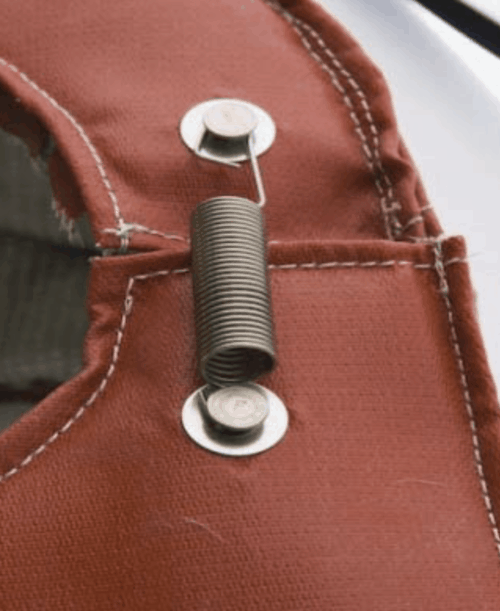Firwin’s removable insulation blankets are generally fastened with stainless steel lacing wire, which we supply with most of our insulation orders. Occasionally, a customer requires an alternate fastening system. Sometimes, the customer’s application may require quick installation or frequent installation and removal of the insulation blankets.
To suit the needs of these customers, we also carry several types of fasteners. Our versatile range of insulation blankets can also be fastened with straps, snaps, springs, and Velcro. These options provide alternative fastening systems and more accessible ways of opening and closing insulation blankets.
Every fastening method has benefits and idiosyncrasies, making it is important to consider which one is right for your application. While choosing a fastener type for your insulation blanket, you should ask yourself the following questions.
- How often will the insulation blanket be accessed?
- Are there any environmental factors, such as temperature, potential water exposure, or corrosive elements, that need to be accounted for?
- What will the installation process look like?
- How much give do you require from your insulation blankets?
- Is this a self-install or will you use a professional contractor?
With answers to those questions, you can go about choosing the fastener that is right for your specific application.
Applications and Benefits of Each Fastener Type
As outlined below, each fastener type is suited for specific applications:
Stainless Steel Lacing Wire
 Our most common insulation blanket fastener is stainless steel lacing wire. Stainless steel lacing wire provides an extra secure fit and durability.
Our most common insulation blanket fastener is stainless steel lacing wire. Stainless steel lacing wire provides an extra secure fit and durability.
Benefits provided by stainless steel lacing wire include:
- It can be bent or tied into any configuration necessary.
- Stainless steel is highly corrosion resistant.
- It is highly durable, and so you will not need to maintain or repair it.
Straps
Our silicone or Teflon straps can be used to fasten insulation blankets for a speedy installation. The benefits of straps include:
- Can be pulled taught for snug fit
- Straps are strong, weather-resistant, non-abrasive, and low-stretch
- Straps can be fitted into a variety of locations.
- Easier and more intuitive than lacing wire
Springs
 Firwin created our own proprietary spring system for attaching insulation blankets. Unimpressed with other spring fastener solutions, we worked with a local manufacturer to develop a spring fastener that was simple to use with a long service life. Some of the benefits of springs include:
Firwin created our own proprietary spring system for attaching insulation blankets. Unimpressed with other spring fastener solutions, we worked with a local manufacturer to develop a spring fastener that was simple to use with a long service life. Some of the benefits of springs include:
- Springs are corrosion resistant, making them ideal for applications with corrosive environmental factors.
- They can be taken on and off easily for temporary applications or uses that require frequent removal and reinstallation.
- Springs maintain their integrity over time; they do not degrade.
- Springs can operate at high temperatures.
Snaps
 We also offer snap closures to our insulation blankets, a cost-effective alternative. The benefits of snaps include:
We also offer snap closures to our insulation blankets, a cost-effective alternative. The benefits of snaps include:
- Excellent shear strength.
- Can be released quickly and easily when pulled at from an angle, making them great for quick-removal applications.
Snaps may not be an appropriate fastening solution for blanket setups that have complex geometries, or in applications that require give when fastening the blankets.
Velcro
 Velcro offers an ideal solution for fastening blankets quickly and easily. The applications vary widely for Velcro, as it can be used on its own or as a supporting fastener in conjunction with other fasteners.
Velcro offers an ideal solution for fastening blankets quickly and easily. The applications vary widely for Velcro, as it can be used on its own or as a supporting fastener in conjunction with other fasteners.
The benefits of Velcro as a fastener for insulation blankets include:
- Easy installation and removal
- Good for low temperature applications
- Affordable (though certain Velcro types such as Nomex or stainless steel come at a premium)
Fasteners from Firwin
There are many different fastening methods available; the most appropriate method for a given application depends on a number of variables – cost, temperature, frequency of removal, speed of installation, and others. At Firwin, we work together with our customers to arrive at the best fastening method for their particular situation.
To learn more about the types of fasteners that Firwin offers, or with questions about fasteners for your specific application, please contact us today.

Comments are closed